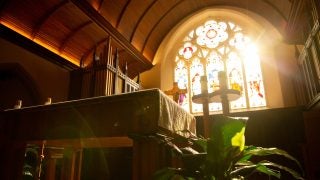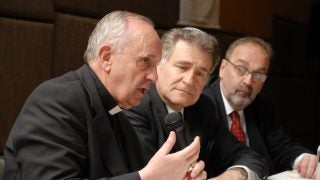Rabbi Abraham Skorka is senior research fellow for Jewish Studies and Jewish-Christian Relations at Georgetown and was a longtime friend of Pope Francis. In this first-person reflection, Rabbi Skorka recounts how he and Pope Francis built an open dialogue through their mutual friendship.
As soon as he was elected Pope, Francis called me on the phone and gave me the email address we could use to keep in touch with each other. From that day in March 2013 until now, we have addressed each other in our correspondence as “Dear Brother.”
Our friendship began in the second half of the 1990s and has been characterized by mutual respect and sincere, direct dialogue ever since. Gradually, we revealed ourselves to one another, opening our hearts.
We built an open dialogue, where disagreements were common, and silences often filled the gaps. We had different views on many topics, but this never diminished the strength of our conversations. We aimed to develop a dialogue in the most profound sense of the term. Whether he was the Cardinal Archbishop of Buenos Aires or the Pope, he never put himself into a superior position over me during our private meetings—whether in my synagogue community, in his office in Buenos Aires, or in the small room on the ground floor of Domus Sanctae Martae in the Vatican. He would often say, “We stand on the same level.”
Francisco, or Jorge Mario, was for me not just an authority figure, but a true friend. In our early meetings together, we shared dreams of building a better world. This was long before his election as Pope, and he confided in me many of his visions and plans after beginning his pontificate.
On the night of October 11, 2012, a historic event took place at the Pontifical Catholic University of Argentina, where Jorge Bergoglio was the Grand Chancellor. For the first time, the university conferred an Honoris Causa Doctorate on a Jew—a rabbi. I will remember this moment forever, especially as it was a key part of the celebrations marking the fiftieth anniversary of the beginning of the sessions of the Second Vatican Council. When he placed the university medal around my neck, he whispered to me, saying, “You don’t know how much I dreamed of this moment.” Through this ceremony, Bergoglio aimed to solidify the church’s new direction for Jewish-Catholic relations
We were in Jerusalem together and embraced in front of the Western Wall, the holiest site in Jewish tradition. This was the place where Jesus preached and Mohammed ascended to heaven according the Christian and Muslim traditions respectively. Alongside our Muslim friend Omar Abboud, we presented an image of Jewish-Christian-Muslim friendship that we hoped would inspire many in the future to pursue the path of peace.
In his autobiographical books, he shared a deeper perspective on what I have briefly described here. In the second chapter of Life: My Story Through History, he recounts stories I shared with him about the Shoah. And he warmed my heart when I read in chapter 19 of Hope: The Autobiography that he wrote of the significance of our friendship and what it meant to him. This was the kind of dialogue that blessed us both.
Francis aimed to purify both his Church and the world. With a very human mix of achievements and missteps, he earnestly sought to create a path along which the presence of God could be more apparent among all people.
Alberto Cortez, an Argentine singer-songwriter, expressed a beautiful sentiment in his song “When a Friend Leaves”: “When a friend leaves, / A burning brand remains / That can’t be extinguished, / Not even by the waters of a river.”
Francis’s affection, humility, and exceptional sensitivity toward the poor, the weak, and those in need will continue to shine through the lasting legacy he has left behind.

